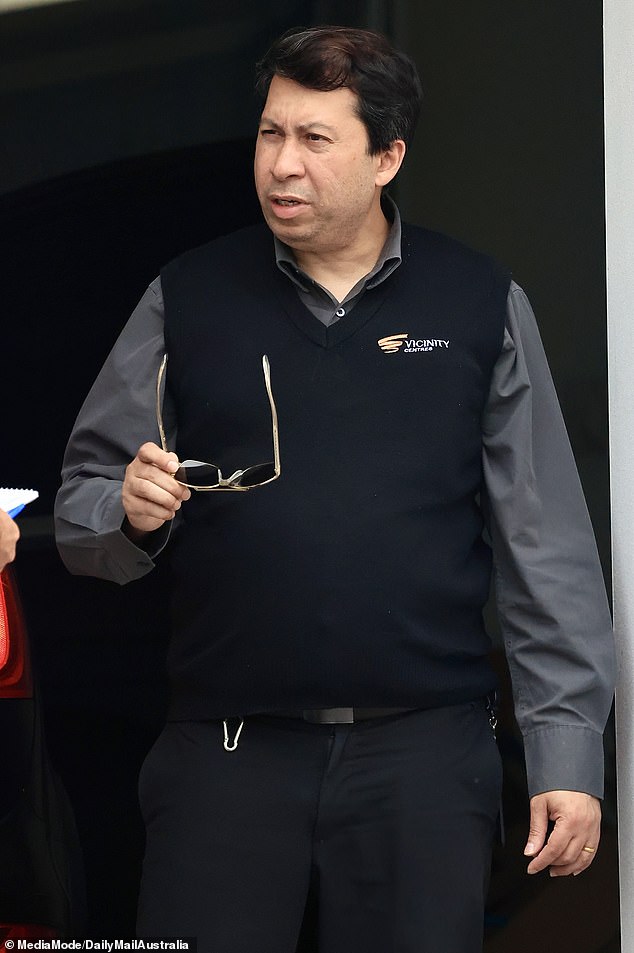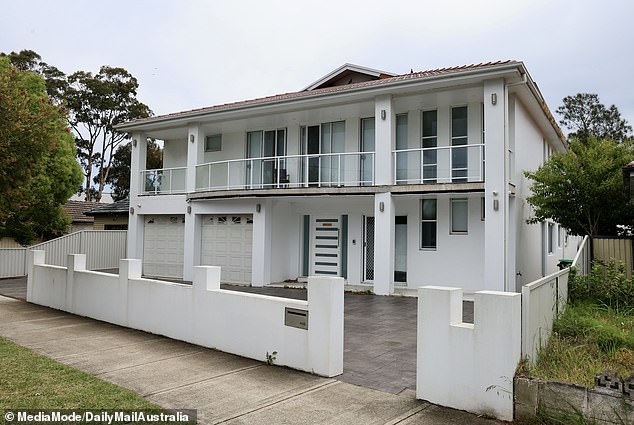Mum-of-four’s nightmare as her ex moves his NEW wife into the family home – while she still lives downstairs
A wheelchair-bound mother of four who suffers from cerebral palsy and speaks through a computer has launched a legal action to have her ex-husband kicked out after he moved his new wife into their 10-bedroom family home.
Saqiba Sattar, who was born with the condition, divorced her husband Muhammad Alam in 2022 after almost two decades of marriage.
The couple, who have four children between them between the ages of six and 19, both still live in the two-storey family home in Punchbowl, south-west Sydney, which was built to meet Mrs Sattar’s needs.
Mr. Alam lives upstairs, while Mrs. Sattar lives downstairs.
This is despite the fact that Mr Alam remarried in Bangladesh to a woman named Rifat Jasmine, shortly after the divorce was finalized in 2022.
Mrs Sattar, who receives full-time home care funded by the NDIS, has been trying to deport her husband since March last year when she filed a claim in the NSW Supreme Court over the terms of her mother’s will.
But matters appear to have come to a head in August when Mr Alam moved his new wife, who does not speak English, into the family home.
This move prompted Ms Sattar to file a lawsuit for ‘urgent injunctive relief’, in an attempt to deport his new wife, Ms Rifat.
Saqiba Sattar, born with cerebral palsy, divorced her husband Muhammad Alam in 2022 after almost two decades of marriage
Ultimately, Sattar failed in her attempt, with Judge James Hmelnitsky ruling that ‘although it is a case which undoubtedly causes distress and humiliation to the plaintiff, Rifat is married to the second defendant and is now helping with the care of the children’.
The judgment, published on October 15, notes that Mr Alam is the primary caregiver of the couple’s four children.
“I accept that the current situation is emotionally disturbing and humiliating to the plaintiff,” Judge Hmelnitsky said.
“The second defendant’s decision to move Rifat to the Punchbowl house, given the current situation between the plaintiff and the second defendant, strikes me as provocative.”
Nevertheless, Judge Hmelnitsky ruled that “the balance of convenience is favorable to maintaining the current unsavory situation for the time being.”
‘The Punchbowl house is very large and although it has not been possible for Rifat to completely isolate herself from the claimant (the claimant can see her coming and going from the house and smell cooking odors, for example), she has mainly been able to do so,’ the verdict added.

The couple, who have four children between them between the ages of six and 19, both still live in a colossal 10-bedroom, two-storey family home in Punchbowl, south-west Sydney, which was built to suit Mrs Sattar’s needs to comply. Mr. Alam lives upstairs, while Mrs. Sattar lives downstairs
“Common sense dictates that both she and the second defendant should do their utmost to respect the complainant’s privacy.”
Speaking through a phone screen where she typed her answers, Ms Sattar told Daily Mail Australia her ex-husband’s decision to move his new wife into the house made her feel “very bad”.
It is clear that Mrs. Sattar’s older children encourage her to let their father stay in the house.
Meanwhile, Mr Alam told this publication that the current situation was being maintained ‘because of the children’.
‘The case was dismissed. “I can live in this house, it’s all good,” he said.
Mr Alam said his children liked his new wife and the situation was not awkward.
‘It’s better for the children. It’s all about the kids and whether they are happy. My new wife makes them dinner,” he added.
Mr Alam said he and his ex-wife only talked about the children and “nothing else”. “If they need anything, she asks me: money, food, these things – nothing else,” he said.
‘We don’t know each other.’

The couple, who have four children between the ages of six and 19, both still live in a colossal 10-bedroom, two-storey family home (pictured) in Punchbowl, south-west Sydney, which was built to meet the needs of Mrs Sattar. Mr. Alam lives upstairs, while Mrs. Sattar lives downstairs
Ms Sattar and Mr Alam bought the house together in 2007 for $428,000.
In 2014, the house was transferred to the name of Ms Sattar’s mother, Qamar Sattar, who died in October 2019.
Two weeks before her death, she made a new will that “has given rise to serious disputes over the terms on which the Punchbowl house will be managed and by whom,” the judgment said.
Mrs Sattar appointed her daughter’s husband, Mr Alam, as administrator of her will and directed that her grandchildren could remain in the Punchbowl estate ‘as long as they wish’.
“My greatest concern is that my daughter Saqiba Mehar Sattar will spend the rest of her life in comfort, with her children and her husband,” the will said.

Mr Alam told this publication that the current situation was being maintained ‘because of the children’
The will added: ‘The trustee (Mr Alam) must not, under any circumstances, grant permission to any person other than those specified in this will, to reside in [the Punchbowl house].’
Mrs. Sattar has argued through her lawyers that she has the right to be the “sole beneficiary” of the Punchbowl mansion and that her ex-husband “has no right to occupy the house,” which is why she is seeking to evict him .
This despite the fact that he claims to have made all mortgage repayments.
‘She submitted that if she is correct in her case that she alone is entitled to the Punchbowl house under the will, then she will be entitled to possession at that stage and therefore Rifat (and the second defendant) will be entitled to the property exclude as an offender,” the judgment said.
‘In response to this, the second defendant pointed out that the will clearly contemplates that he in any case has the right to continue to occupy the property in order to continue to care for the children and that, if properly constructed, he would therefore have the right to with his wife.’
Judge Hmelnitsky said neither Mr Alam nor his new wife wanted to live apart and the children would likely move with their father if forced to do so.
“If the outcome of the latest proceedings is that the second defendant is not entitled to continue occupying the Punchbowl house, I infer that he, Rifat and the children will all move out,” Judge Hmelnitsky added.
The dispute over the terms of the will will be last heard by the High Court in February.
